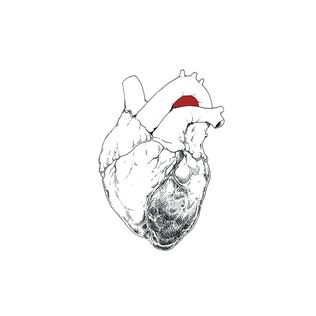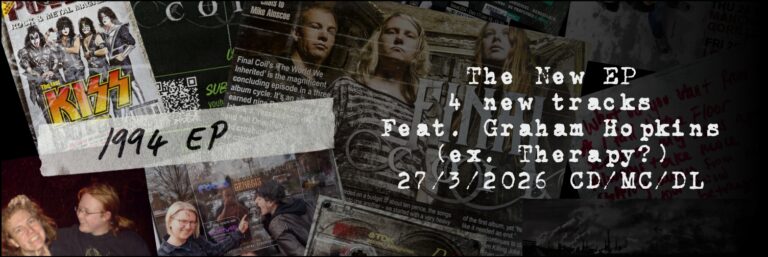
It’s taken some time to get to The Beggar, the sixteenth album from Swans, and their sixth since their surprise return in 2010. Long term fans of the band will, perhaps, understand the predicament. Swans are unique and require a certain amount of patience, time, and emotional dedication, for the Swans, played at the wrong moment, can simply feel too intimate and too raw to achieve the necessary distance to put pen to paper.
Such is the nature of art. Music can and should trigger complex emotions, not sit in the background; but it does tend to mean that the most compelling works are also the most challenging to review, especially if you have other aspects of life with which to contend. At any event, a little late (but better late than never), I find myself, with rain tracing light patterns across the windows of my home, and the full two-hours necessary to absorb the monumental work that is The Beggar. As it transpires, it is still not enough, not least because the second disc (two tracks, clocking in at just under an hour), eventually requires multiple listens before I feel confident enough to attempt to write about it, and I still feel as if I’ve only scratched the surface of its hidden depths.
Disc One
The Beggar opens with The Parasite, a subtle, slow-burning piece of music that slowly edges from acoustic lament, closer in aspect to Angels of Light, to an astringent drone that seems to float somewhere in the air between your speakers. At the heart of it all, Gira’s voice drifts enigmatically within the mix, beckoning you deeper within the gossamer-fine strands of hypnotic feedback draped around him. It’s followed by the gorgeous, mid-tempo Paradise is Mine, which takes a simple motif, augments, and repeats, slowly chipping away at the listener’s ability to resist.
Having eased the listener in, third track, Los Angeles: City of Death, emerges as a spiritual sequel to Here Comes the Sun from Great Annihilator, with its queasy, underpinning riff, and taut, semi-industrial percussion. The sort of track that has the potential to overwhelm in the live arena, it’s a tense and angular piece of music, although the band reign it in before it becomes too tumultuous, slipping into the music box lullaby of Michael is Done, a track drenched in post-rock ambience and unfathomable beauty.
With the listener lost in a reverie, Michael returns once more to Angels of Light for Unforming, an achingly beautiful piece of music that sees his rich baritone backed by the glistening sounds of the hammered dulcimer, an instrument rarely heard in contemporary music, but which adds a glorious shimmer to the track. Unusually, the music comes to a dead stop at the end of Unforming, creating a natural break before the stark ambience of The Beggar sees things taking a darker turn, caught between the eerie rumble of the Swans are Dead live album and early Bad Seeds. A masterly exercise in tension and release, The Beggar gathers pace, although the heavily delayed lead guitar keeps things from becoming too harrowing. In contrast, the weary No More of This feels like a final farewell, addressing both the sorrow of departure and the relief of finally being able to lay down a heavy burden. Quite possibly one of the most heart-breaking pieces of music that Michael Gira has ever penned, No More Of This is an elegant yet haunting track. It’s followed by the simple, childlike melody of Ebbing, which develops into a lengthy drone reminiscent of Spiritualized, the use of repetition invoking a trance-like state when played free from external distraction.
The first disc concludes with the lyrically brutal, sonically unnerving Why Can’t I Have What I Want Anytime I Want – another track that sees Michael Gira and the current iteration of the band explore a very different sonic territory. Slow paced, but with guitars that creep across the surface, feeling for cracks and trying to pry their way in, it’s a strangely claustrophobic piece, for reasons that are not easy to delineate. It also marks the end of a remarkable first disc which, for all that it soothes and savages the listener, still fails to prepare the listener for what is yet to come.
Disc Two
With the first disc having functioned as a (relatively) straight-forward album, the second disc is a far denser experience, offering just two tracks over the course of fifty minutes. The first piece, The Beggar Lover (Three)is a forty-minute-long instrumental journey (spoken word samples notwithstanding), initially reminiscent of No Words / No Thoughts, with its chiming bells and steadily rising strings. It builds to a cacophony of howling noise early on, before a choir pierce the gloom with wordless vocals, their close harmonies setting the stage for a second section that veers from haunting brass drones and the icy strands of the Dulcimer to industrial rhythms and post-rock guitar noise. A truly stunning piece of music, while it has its roots in the found sounds and sonic experiments of Soundtracks for the Blind, there are also nods to Thurston Moore’s recent, lengthy pieces, as well as cinematic elements worthy of James Horner and Elliot Godenthal, making for a remarkable voyage into your own personal dreamscape.
The piece progresses next into a central section comprising wave after wave of very human, very beautiful vocals, there’s a sense of hope here, although it doesn’t take long for things to devolve, with the vocals buried under a scree of digital noise. What follows is oblique but not oppressive (unless you bring your own darkness to the piece), with percussive elements, found sounds, and abstract noise creating an aural tapestry that seeks to envelop the listener. It’s not a piece easily described, for one e lost within it, time itself seems to lose its meaning.
The second track, The Memorious, provides a neat coda to the disc, and to the album as a whole, Michael intoning the lyrics, as a child cries in the background. With choral textures and eerie samples, it pairs psychedelic imagery worthy of Edgar Allen Poe with a relentless, cyclical riff, which, for all that it’s played clean, is no less powerful than the heaviest distorted guitar. Building over the course of some eight-and-a-half minutes, it takes on a hymnal quality, and the listener emerges from this remarkable second disc feeling somehow refreshed.
While the first act of The Beggar is impressive, the second act is nothing short of magnificent. The Beggar Lover (Three) is a truly monumental piece of work, filled with rich textures reminiscent, in places, of the experimentation found in early prog albums (before technicality sought to obscure artistry). At forty minutes, this predominantly wordless piece plays more like a soundtrack to some obscure, and long-forgotten movie, and every listener is liable to populate it with their own landscapes and characters. This is the beauty of the modern iteration of Swans’ open-ended and generous sonic landscapes, and it serves as a gift to long-standing fans of Michael Gira’s work.
The Beggar
The Beggar is a work of staggering scope. While Swans have never made the same album twice, there are enough call backs to previous records to make this recognisably swans while, at the same time, the band’s sonic evolution continues to astound. It is a work of wonderful generosity, a gift to fans who are somehow able to find themselves amidst the tumultuous outpourings, neo-psychedelic meditations, and moments of aching beauty – put simply, you take out of The Beggar what you bring in.
I’m always nervous reviewing Swans – the myriad layers and emotions found in the music, combined with the subjectivity a reviewer necessarily brings to music so inscrutable, makes an already uncertain occupation even more tenuous. Nevertheless, my feeling, as flawed as it might be, is that this is a masterpiece of light – especially the towering sonic edifice that is The Beggar Lover (Three) – and a remarkable offering from a band who continue to defy the strictures of what it means to be a “rock” band. 10/10



